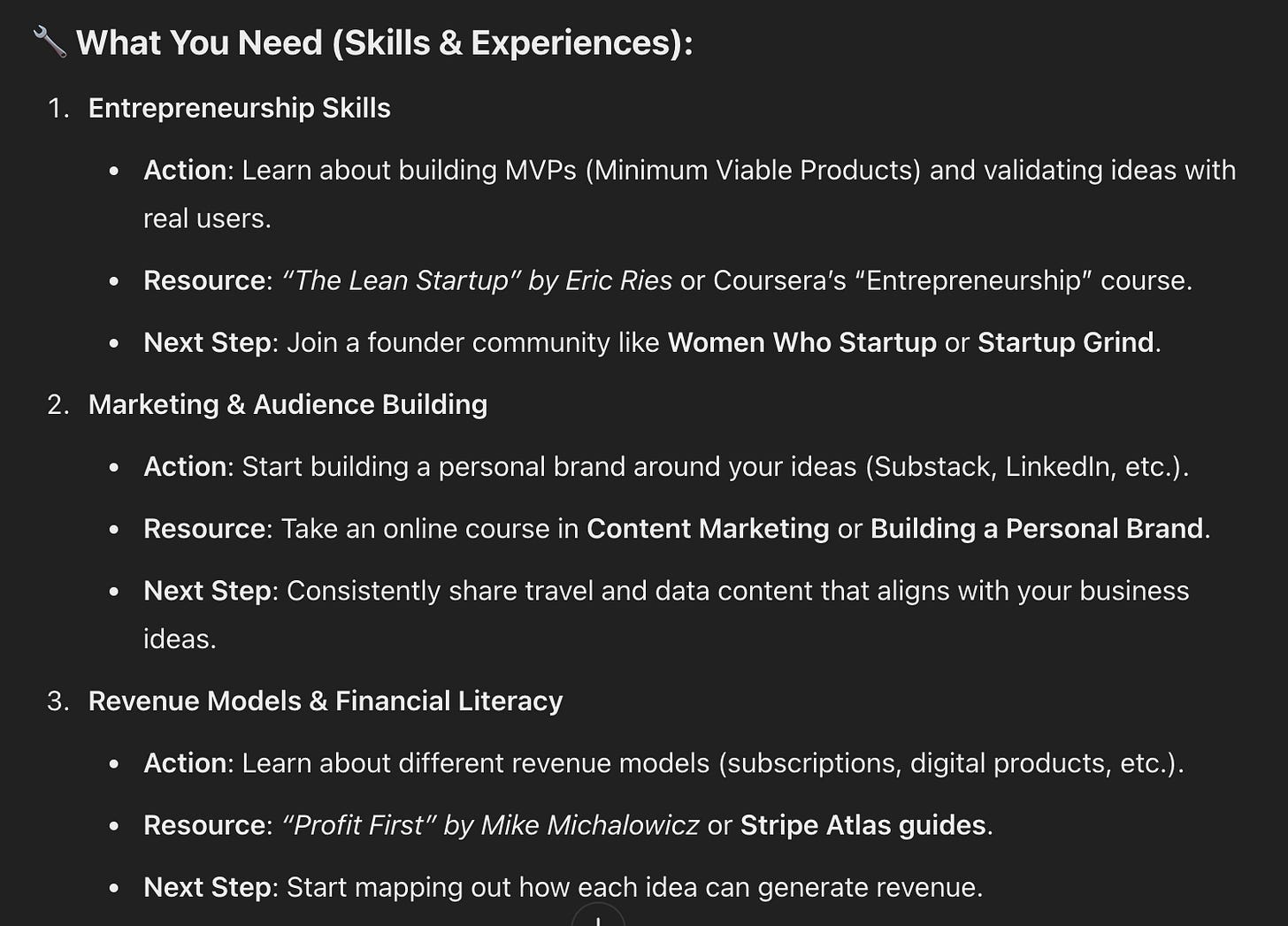I love the start of a new year. It’s a time of reflection and reimagining of self and possibilities. I’m also a planner at heart, so January is a beautiful time to imagine and plan the ideal yet practical world I could build for myself. I methodically plan the year with goals, actions, habits and mindset to drive joy and success.
This is where I enjoy using AI as a tool that can support me. I treat ChatGPT as my goal-setting partner, helping me discover the skills and habits I may need to achieve the goals for the year.
I fed my 3 goals into ChatGPT and used it to help me drive methods, mindsets and habits towards them. It helped me outline actionable steps toward my goals, created a tailored morning routine that fit my schedule, and even suggested daily time-blocks to balance rigor, rest, and fun.
Here are my favorite responses to some of the prompts I asked to set my 2025 for success:
Prompt: What are the skills and experiences I need to make these goals successful?
My inputs: I provided the skills and experiences I already have to achieve these goals and asked it to define additional skills and experiences needed. I kept my skills and experiences broad, intentionally avoiding details like specific job roles, companies, or certifications. Rather I used statements such as “Experience and knowledge in data + consulting” or “Experience in having a consistent exercise routine, while training for a marathon” to emphasize my current experiences.
ChatGPT’s response: For each goal, it provided 3-4 skills and experiences I need and under each skill and experience it provided an action, resource, and a next step! The resource was the most interesting, since that wasn’t even something I thought of in the prompt, yet a great addition to consider.
I have a habit of being overambitious and overcommitting to actions before they even occur and ChatGPT can exacerbate that with its information. Therefore I prioritized only the actions and resources I found most interesting or manageable, which were about 10 actions/resources out of the 36 it provided.
Prompt: Based on my goals and the below notes on my schedule constraints and ideal habits, develop my ideal weekly schedule.
My inputs: I provided notes on my current work, class and life schedule constraints, ideal habits and ideal wakeup and sleep times. I did not provide exact schedules of my day, rather gave it general frameworks such as “I have class in the morning and evening” or “I want to hike on weekends.”
ChatGPT’s response: ChatGPT gave me a weekday and weekend morning routine as well as a daily schedule, all with time blocks! It was also grounding because it provided time blocks for errands and life things which I usually forget when I time block myself.
It even offered tips on maintaining consistency with my new schedule. I didn’t find them very helpful but interesting nonetheless since it provided insights beyond my initial prompt. ChatGPT then asked if I’d like it to create a digital calendar template for Notion or Google Calendar which I said yes to. That didn’t work as I’d expected it to. It built a CSV file of what it spit out, but in that CSV only the morning routine was dated and timed, not the rest of the weekly schedule. It’s important to remember that although it may sound like it knows what it’s doing, ChatGPT is still a large language model with limitations!
Below are why each goal is important to me as well as the mindset I'd like to have around each. Help me create 3 lofty questions I can take 10 mins journaling about to start my day in the best mindset.
My inputs: I gave a paragraph around why each goal is important to me and some mindsets I’d like to have such as “I am deserving of wealth and success,” “I am strong, healthy and powerful”, and “I deserve love and everlasting happiness.”
ChatGPT’s response: It gave me a lofty question for each goal that I will enjoy answering before I start each day! It even suggested that I spend 10 mins on one question each day versus answering all 3 each day. Along with the lofty question, it provided a consolidated mindset “tagline” and a short sentence on “why this works.” It even provided a “Final Tip: At the end of your journaling session, write one action step for the day that aligns with your reflections.” Again an added-value that was not included in my prompt!
Using ChatGPT as a way to elevate my 2025 planning is a great example on how AI can be used to support us in a way that benefits us. It is important to note that we have to be careful how we provide our data so that we aren’t giving it too much information or sensitive information that can target us.
Here’s a quick reminder of personal information people often share on ChatGPT, but isn’t necessary to achieve useful results:
Full names
Locations
Financial status and aspirations
Company names or Job titles
An exact daily schedule
Mental health vulnerabilities or intimate details about a person
Throughout my goal-setting process, I kept my inputs intentionally vague. I avoided sharing personal details like names, locations, or intimate mental health information. I still got useful results which I leveraged as a framework to build on to for the exact habits and schedule that works for me in 2025. Using AI tools with intention shows how technology, when thoughtfully applied, can be a reliable ally in achieving our goals.





